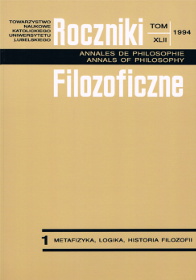Processes and Things-in-Processes: Dorothy Emmet’s Metaphysics
Abstract
The article, based on Dorothy Emmet’s book The Passage of Nature (Houndmills: Macmillan 1992), presents and discusses her metaphysical views concerning particulars. Emmet, who is an analytic thinker, makes use of some of A.N. Whitehead’s ideas concerning the nature of reality. She regards as particulars: events, processes and things (including persons). Events are occurances which doesn’t change: they are not in the state of kinesis but rather in the state of stasis, they are separated from each other and discontinuous. Processes are not sequences of events, but totally different kind of particulas: they are continuous and constituted of various phases but they are not completed on any of its phases, except the last one. Emmet needs processes as particulars since she regards intuition of transition (intuition that something is going on) as being primitive and not included within the notion of an event. She argues that many traditional difficulties, e.g. in the notion of causation may be fruitfully approched by using the notion of process. However, neither events nor processes could exist without things which Emmet regards as the most basic metaphysical particulars. They may have various relations to events and processes. Some procesess (e.g. shoping) may be carried on without this or that concrete thing but there must be some thing for them to be possible; Emmet calls them things in processes. They are different from things-in- processes (something like traditional substances), such as e.g. living organisms since participation in certrain processes (e.g. in the process of biological development) is constitutive for them.
It Emmet’s generally clear and precise presentation there are, however, some difficulties. It is not clear which particulars are metaphysical and which are useful only methodologically or epistemologically, it is not obvious then, what is the relation between events, processes and things-in-processes. A question also arises, how small things-in-processes (e.g. atoms, cells or whatever may be called by that name on microcosmic level) may coexist synchronically within bigger thing-in-process (e.g. some organism). The methodological character of her metaphysics (revisionary but not too revisionary) also needs further explication.
Copyright (c) 1994 Roczniki Filozoficzne

This work is licensed under a Creative Commons Attribution-NonCommercial-NoDerivatives 4.0 International License.





